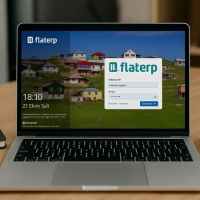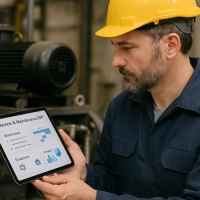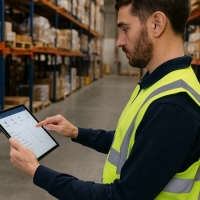
Management of All Processes on a Single Platform
Data from departments like production lines, supply chain, sales, and finance are managed through a single, integrated database in ERP software. This integration creates seamless connectivity across all processes, from material requirements planning (MRP) to machine maintenance.
Real-Time Data and Rapid Decision Making
ERP systems collect data from sensors and machines in real time. Managers can update production plans in real time and instantly access critical information such as capacity and inventory status. This allows for quick and accurate responses to situations like sudden order increases or supply delays.
Cost and Resource Optimization
Cost items such as raw materials, labor, and energy consumption are continuously monitored through ERP. Flaterp's advanced reporting and analysis tools enable proactive intervention by identifying cost deviations early on . This reduces waste rates and keeps production costs under control.
Special Advantages for the Manufacturing Sector
1. Uninterrupted Flow in Material and Stock Management
One of the most critical steps in production planning is correct raw material management.
Flaterp ERP defines minimum and maximum stock levels , automatically creates orders at critical stock levels, and operates fully integrated with the supply chain. This prevents production halts due to material shortages or idle capital due to excess inventory.
2. Flexibility in Production Planning and Scheduling
Production processes are directly affected by machine breakdowns, demand fluctuations and shift changes.
Flaterp's Production Planning Module automates capacity planning, sequences work orders efficiently, and predicts delays. This reduces waste and shortens delivery times .
3. Quality Control and Traceability
The production phase of each batch, the raw material lots used and quality test results are recorded in ERP.
Full traceability is ensured in the event of a product return or quality audit. This is particularly critical for the food, pharmaceutical, and automotive industries.
4. Energy and Maintenance Management
With ERP's IoT integration, machine performance, energy consumption and maintenance needs are continuously monitored.
Planned maintenance and failure prediction modules minimize unexpected shutdowns and high energy costs .
5. Human Resources and Workforce Efficiency
Flaterp ERP automates shift scheduling, reports workforce performance in real time, and offsets overtime costs.
This both increases employee satisfaction and optimizes labor costs.
Long-Term Contributions of Digitalization
ERP software not only facilitates the daily monitoring of production operations, but also contributes to the strategic growth and competitive advantage of companies.
- Data-Driven Decision Making: Senior management makes fast and accurate decisions by seeing critical information such as cost, capacity and customer demand on a single screen.
- Sustainability: Reducing energy consumption and raw material waste provides advantages to the business in terms of both cost and environmental aspects.
- Adapting to Global Competition: Thanks to real-time reporting and flexible production planning, companies can respond quickly to sudden increases in demand.
Digital Power in Production Processes with Flaterp ERP
Flaterp offers flexible solutions to the needs of companies with its modular and cloud-based structure developed specifically for the manufacturing industry.
- Capacity and workforce optimization with the Production Planning and Scheduling Module ,
- Automatic supply and cost control with Stock and Purchasing Management ,
- Instant profitability tracking with Finance and Accounting ,
- Provides strategic decision support to managers with Business Intelligence Panels .
Flaterp's real-time reporting and user-friendly interface make it easier for manufacturing companies to make data-driven decisions and accelerate the return on investment .
Conclusion: ERP is a Must for Competitive and Sustainable Production
In the manufacturing industry , ERP software is no longer a choice but a necessity to reduce costs, shorten delivery times and respond quickly to customer demands.
Flaterp ERP digitalizes every process from raw material supply to production planning, from quality control to financial reporting, providing businesses with up to 20% cost savings and increased efficiency .
Businesses that invest in ERP not only adapt to today's competitive environment, but also take a strong step towards becoming the smart factories of the future .
























